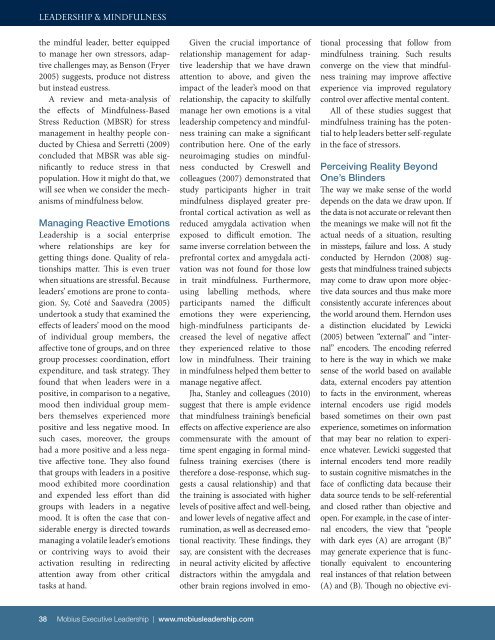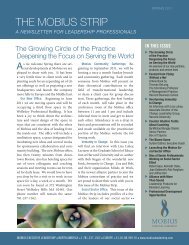Leadership & Mindfulness - Mobius Executive Leadership
Leadership & Mindfulness - Mobius Executive Leadership
Leadership & Mindfulness - Mobius Executive Leadership
You also want an ePaper? Increase the reach of your titles
YUMPU automatically turns print PDFs into web optimized ePapers that Google loves.
LEADERSHIP & <strong>Mindfulness</strong>the mindful leader, better equippedto manage her own stressors, adaptivechallenges may, as Benson (Fryer2005) suggests, produce not distressbut instead eustress.A review and meta-analysis ofthe effects of <strong>Mindfulness</strong>-BasedStress Reduction (MBSR) for stressmanagement in healthy people conductedby Chiesa and Serretti (2009)concluded that MBSR was able significantlyto reduce stress in thatpopulation. How it might do that, wewill see when we consider the mechanismsof mindfulness below.Managing Reactive Emotions<strong>Leadership</strong> is a social enterprisewhere relationships are key forgetting things done. Quality of relationshipsmatter. This is even truerwhen situations are stressful. Becauseleaders’ emotions are prone to contagion.Sy, Coté and Saavedra (2005)undertook a study that examined theeffects of leaders’ mood on the moodof individual group members, theaffective tone of groups, and on threegroup processes: coordination, effortexpenditure, and task strategy. Theyfound that when leaders were in apositive, in comparison to a negative,mood then individual group membersthemselves experienced morepositive and less negative mood. Insuch cases, moreover, the groupshad a more positive and a less negativeaffective tone. They also foundthat groups with leaders in a positivemood exhibited more coordinationand expended less effort than didgroups with leaders in a negativemood. It is often the case that considerableenergy is directed towardsmanaging a volatile leader’s emotionsor contriving ways to avoid theiractivation resulting in redirectingattention away from other criticaltasks at hand.Given the crucial importance ofrelationship management for adaptiveleadership that we have drawnattention to above, and given theimpact of the leader’s mood on thatrelationship, the capacity to skilfullymanage her own emotions is a vitalleadership competency and mindfulnesstraining can make a significantcontribution here. One of the earlyneuroimaging studies on mindfulnessconducted by Creswell andcolleagues (2007) demonstrated thatstudy participants higher in traitmindfulness displayed greater prefrontalcortical activation as well asreduced amygdala activation whenexposed to difficult emotion. Thesame inverse correlation between theprefrontal cortex and amygdala activationwas not found for those lowin trait mindfulness. Furthermore,using labelling methods, whereparticipants named the difficultemotions they were experiencing,high-mindfulness participants decreasedthe level of negative affectthey experienced relative to thoselow in mindfulness. Their trainingin mindfulness helped them better tomanage negative affect.Jha, Stanley and colleagues (2010)suggest that there is ample evidencethat mindfulness training’s beneficialeffects on affective experience are alsocommensurate with the amount oftime spent engaging in formal mindfulnesstraining exercises (there istherefore a dose-response, which suggestsa causal relationship) and thatthe training is associated with higherlevels of positive affect and well-being,and lower levels of negative affect andrumination, as well as decreased emotionalreactivity. These findings, theysay, are consistent with the decreasesin neural activity elicited by affectivedistractors within the amygdala andother brain regions involved in emotionalprocessing that follow frommindfulness training. Such resultsconverge on the view that mindfulnesstraining may improve affectiveexperience via improved regulatorycontrol over affective mental content.All of these studies suggest thatmindfulness training has the potentialto help leaders better self-regulatein the face of stressors.Perceiving Reality BeyondOne’s BlindersThe way we make sense of the worlddepends on the data we draw upon. Ifthe data is not accurate or relevant thenthe meanings we make will not fit theactual needs of a situation, resultingin missteps, failure and loss. A studyconducted by Herndon (2008) suggeststhat mindfulness trained subjectsmay come to draw upon more objectivedata sources and thus make moreconsistently accurate inferences aboutthe world around them. Herndon usesa distinction elucidated by Lewicki(2005) between “external” and “internal”encoders. The encoding referredto here is the way in which we makesense of the world based on availabledata, external encoders pay attentionto facts in the environment, whereasinternal encoders use rigid modelsbased sometimes on their own pastexperience, sometimes on informationthat may bear no relation to experiencewhatever. Lewicki suggested thatinternal encoders tend more readilyto sustain cognitive mismatches in theface of conflicting data because theirdata source tends to be self-referentialand closed rather than objective andopen. For example, in the case of internalencoders, the view that “peoplewith dark eyes (A) are arrogant (B)”may generate experience that is functionallyequivalent to encounteringreal instances of that relation between(A) and (B). Though no objective evi-38 <strong>Mobius</strong> <strong>Executive</strong> <strong>Leadership</strong> | www.mobiusleadership.com



